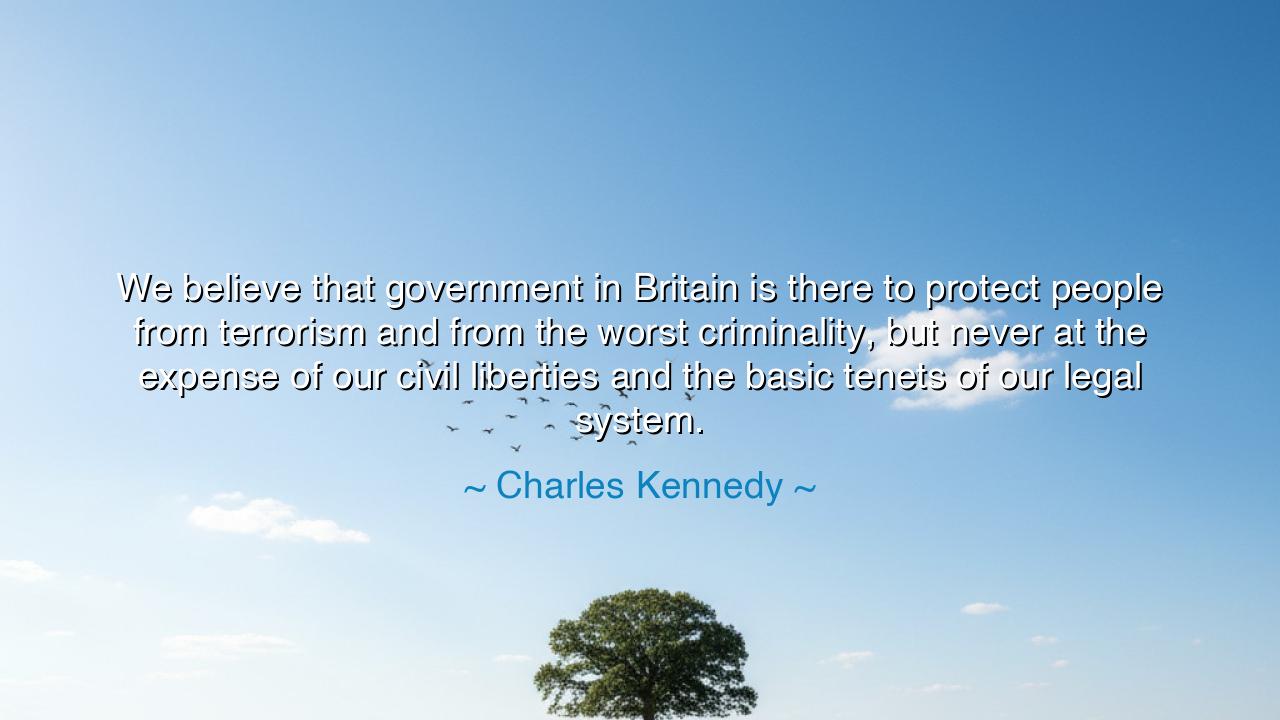
We believe that government in Britain is there to protect people
We believe that government in Britain is there to protect people from terrorism and from the worst criminality, but never at the expense of our civil liberties and the basic tenets of our legal system.






In the long arc of human governance, few truths have endured as insistently as the balance between security and liberty. Charles Kennedy’s words, “We believe that government in Britain is there to protect people from terrorism and from the worst criminality, but never at the expense of our civil liberties and the basic tenets of our legal system,” illuminate a principle that resonates across centuries: the power of the state must be exercised to safeguard, not to dominate; to protect, not to diminish, the rights of its citizens. Here lies a meditation on justice, prudence, and the eternal tension between fear and freedom.
From the city-states of ancient Greece to the republics of Renaissance Italy, rulers wrestled with this delicate equilibrium. Security was paramount, yet when the machinery of protection intruded upon personal liberty, unrest and tyranny often followed. Kennedy’s reflection recalls these historical lessons: a government that sacrifices the core tenets of law and civil rights for the sake of immediate safety risks undermining the very foundations of society it seeks to protect. True governance is measured not merely by the suppression of threats but by the preservation of enduring principles.
History offers vivid illustrations. During the English Civil War, measures taken to secure loyalty and order sometimes infringed upon rights of property, speech, and assembly. While the Crown and Parliament sought to protect the realm from rebellion, overreach often bred resentment and further conflict. Kennedy’s words echo this lesson for modern times: the pursuit of security must be carefully constrained by law and morality, lest it erode the liberties that make society just and humane.
Consider the events of post-9/11 Britain, when fears of terrorism led to the introduction of measures such as extended detention and enhanced surveillance. While these actions were aimed at protecting the populace, public debate highlighted the risk of encroaching upon civil liberties. Kennedy’s stance reflects the enduring wisdom of the ancients: protection and liberty are not opposing forces, but must coexist; a government that sacrifices one for the other endangers both. The vigilance of citizens and lawmakers alike becomes the safeguard of this balance.
The philosophical resonance of Kennedy’s words is profound: the legitimacy of government rests not only on its capacity to defend but on its fidelity to justice, due process, and fundamental rights. Security measures that bypass legal protections may offer temporary relief, but they corrode trust, undermine fairness, and diminish the moral authority of the state. History has shown repeatedly that societies flourish when liberty and safety are intertwined, and falter when fear eclipses principle.
A real-life historical example underscores this lesson. During World War II, Britain implemented measures such as censorship and detention of suspected enemy sympathizers. While these actions aimed to secure the nation, post-war reflection emphasized the importance of restoring civil liberties as quickly as possible. Kennedy’s words echo this careful balance: protection is necessary, but the erosion of fundamental rights must never be accepted as permanent or trivial.
Practically, this teaching calls for vigilance, awareness, and participation. Citizens must hold governments accountable, ensuring that laws and security measures protect without undermining civil liberties. Engage in public discourse, understand the mechanisms of legal protections, and advocate for transparency and proportionality in matters of security. The measure of a free society lies in its capacity to defend both its people and its principles.
Thus, Charles Kennedy’s reflection endures as a timeless admonition: the purpose of governance is to safeguard life and order, yet never at the cost of the liberties and legal foundations that define civilization itself. Let this wisdom guide leaders and citizens alike, reminding all that the preservation of freedom alongside security is the eternal test of a just and enduring society. In balancing fear with principle, vigilance with liberty, one secures both safety and the soul of the nation.






AAdministratorAdministrator
Welcome, honored guests. Please leave a comment, we will respond soon